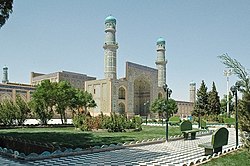The following is an incomplete list of large mosques in Afghanistan:
| Name | Image | Province | City | Year | Remarks |
|---|---|---|---|---|---|
| Abdul Rahman Mosque |  | Kabul Province | Kabul | 2009 | One of the largest mosques in Kabul. |
| Abul Fazl Mosque |  | Kabul Province | Murad Khane, Kabul | ||
| Friday Mosque of Kandahar |  | Kandahar Province | Kandahar | 1750 | Houses the cloak of the Islamic prophet Muhammad. |
| Gaza Mosque | Kabul Province | Kabul | 2025 | ||
| Imam Bargah Mosque | Kandahar Province | Kandahar | ? | Scene of the 2021 Kandahar bombing. [1] | |
| Omar Al-Farooq Mosque | Kandahar Province | Kandahar | 2014 | One of the largest mosques in Kandahar. [2] | |
| Hajji Dunya Gul Niazi Jamia Masjid | Laghman Province | Mihtarlam | |||
| Great Mosque of Herat |  | Herat Province | Herat | 1446 | The mosque was the city's first congregational mosque, built on the former site of two smaller Zoroastrian Fire temples destroyed by earthquake and fire. |
| Shrine of Ali |  | Balkh Province | Mazar-i-Sharif | ? | The largest mosque in the province, also referred to as the Great Blue Mosque of Mazar-i-Sharif. |
| Sakhi Shrine (Ziarat-e Sakhi) | Kabul Province | Kabul | ? | Also known as Karte Sakhi Shrine | |
| Mosque of Jalalabad |  | Nangarhar Province | Jalalabad | ? | One of the largest mosques in the province. |
| Lashkargah Mosque |  | Helmand Province | Lashkar Gah | ? | One of the largest mosques in the province. |
| Khost Mosque | Khost Province | Khost | 2000 | The largest mosque in the province. | |
| Amir Ali Shernway Mosque | Jowzjan Province | Sheberghan | 2017 | The largest mosque in Jowzjan province. Built by Turkey. [3] | |
| Gozar-e-Sayed Abad Mosque | Kunduz Province | Kunduz | ? | Scene of the 2021 Kunduz mosque bombing | |
| Red Mosque | Kandahar Province | Kandahar |